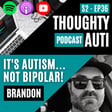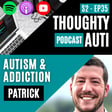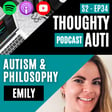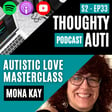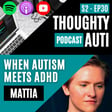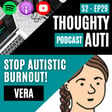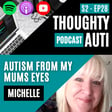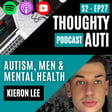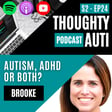
Autistic Masking Is Language - Building Social Skills On The Spectrum w/Adam Mohamed
What autistic traits can and can't you work on? How can an autistic person become sociable? What is the University party experience like?
In this episode of the Thoughty Auti Podcast, Thomas talks to his good friend Adam Mohamed about their days of parties and social events at University... highlighting some of the ways they overcame the social deficits of an Autism Spectrum Disorder (ASD).
At first, they talk about Adams experience on the hit autism documentary 'Aspergers In Society' as well as his current jobs of high-class bartending and making testing kits for COVID-19. Diagnosed at just 3 YEARS OLD, Adam received a lot of support during primary school, but eventually took the reins and made his own way to becoming a social butterfly.
Masking is a language?! What do I mean by that?
Well there's a large negative assumption that putting on a mask of social competence is something solely found in autistic people, and moreover the mindset you have towards social encounters can dictate whether masking is beneficial or soul destroying!
We chat about the differences in our upbringing, the differing methods we used to develop our social skills at the start, how to pick and choose the best social environments for you, and how to deal with the negative experiences when you first enter that scary communicative minefield.
If you have an exciting or interesting story and want to appear on the next podcast, please contact me at: aspergersgrowth@gmail.com
Aspergers In Society Documentary - https://youtu.be/eLpcPOSFfNE
Adams Behind The Scenes Interview - https://youtu.be/ndqRo_Xsu5Y
▬▬▬▬▬▬▬▬▬▬▬▬▬▬▬▬▬▬▬▬▬▬▬▬▬▬▬▬▬
Channel Merchandise - https://teespring.com/stores/aspergers-growth
Support via Patreon! - https://www.patreon.com/aspergersgrowth
Social Media ♥ -
☼ Facebook - Aspergers Growth
☼ Twitter/Instagram - @aspergersgrowth
♫ Listen On -
Spotify - https://open.spotify.com/show/6vjXgCB7Q3FwtQ2YqPjnEV
Apple Podcasts - https://podcasts.apple.com/gb/podcast/thoughty-auti-the-autism-mental-health-podcast/id1470689079
Music -
♫ Track: [Chill Music] Ikson - Reverie [No Copyright Music]
Advert Track: Empty Parking Lot - Colours Of Illusion [Epidemic Sound]







